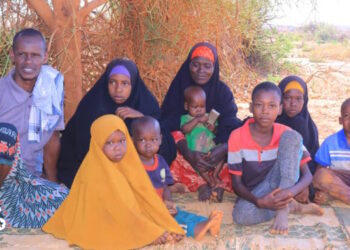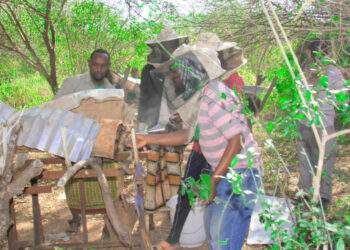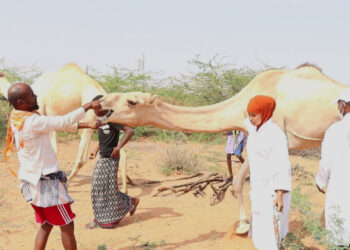(ERGO) – An undiagnosed livestock disease affecting goats and sheep in Bahdo, central Somalia’s Galgadud region, is causing distress among herding families in the area.
Pastoralists in Qalanqal, Dhumodle, and Aliwayd say the few animals they have left are weak and unproductive and livestock deaths among their herds are occurring daily.
Abdinur Abdullahi Hassan, a pastoralist in Dhumodle, said the outbreak that began in July had impoverished his family of seven children.
“There is no proper food. We cook once a day at night, and in the morning sometimes we cook again if we have something. It’s not guaranteed, sometimes we eat, sometimes we don’t, because we rely on what little we can find. Life is extremely tough. When we still had our livestock, we were doing fine and used to cook three times a day. Now it’s reduced to once, as life has become unbearable,” he said.
Abdinur said he had lost 35 goats and the 20 animals left were sick and too weak to walk or graze. He borrowed money and spent about $70 on treatment, to no effect.
“Lack of money has stopped me. I don’t have anything left to buy medicine or take them to the vet. If you have money, you can travel and treat them, but I can’t even move them because they are too weak to walk. They are dying and suffering, the situation is desperate. They are like dying animals that just need to be buried,” he said.
The previous two rainy seasons in this area have been very poor and severe drought has destroyed pasture and vegetation and made livestock more vulnerable to disease. Pastoralists complain that they have not received any veterinary services to identify the disease or control its spread.
“I am unemployed, and whatever little I had is gone. Life has become very hard since my livestock, my only means of income, have mostly perished. I don’t see any solution in sight,” Abdinur stated.
Another herder, Abdirisak Dahir Yusuf, lost 26 goats, and described how the disease took its toll on infected animals within three to seven days.
“This disease affects the animal around the shoulders, then it foams at the mouth. The goat becomes weak and collapses inside the enclosure. You can see pus and fluid coming out of its stomach. The meat cannot be eaten because the animal’s insides decay quickly,” he said.
Abdirisak’s remaining goats are all too weak to leave the shed enclosure. In July and August, he bought food on credit, but by mid-September local shopkeepers stopped lending after his debt reached $270.
“The situation is dire. We once lived well, but now the livestock are few. We have nothing to sell or slaughter. The animals are thin and sick, not fit for use. I only have 12 left, none of which can even be slaughtered,” he said.
Abdirisak, who has five children, said this is the hardest situation he has faced in his 34 years in the rural areas of Galgadud region. He said he has reached out to relatives in Mogadishu, Adado, and Bahdo, but received no help or support as everyone is struggling economically.
Livestock disease has compounded the harsh challenges facing rural pastoralists, along with the drought and also conflicts in the region.
Kahiye Omar Yarow, a father of six from Aliwayd, said disease had killed 18 of his goats since July, while 40 others were sick and no longer producing milk or bringing in income.
“We used to rely on shallow wells, but they have dried up. Water now comes by private tankers, and a barrel costs $5. Conflicts have also blocked access to some water points, so we depend on neighbours or people travelling to nearby towns to ask for water,” he said.











